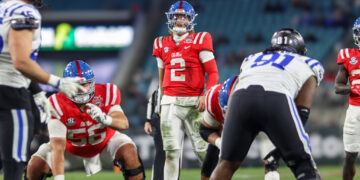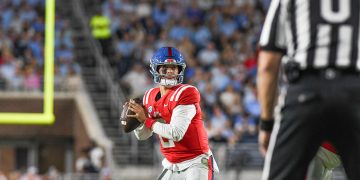
At a time when the expectation is that college students approach their higher education like it is a job, it is difficult to imagine that students would also take on the additional burden of working during their time in college.
Labor force participation among college students is declining nationwide. According to the Bureau of Labor Statistics, 42.4% of full-time students had jobs in 2022, compared to 51.8% in 2002 and 45.7% of students in 2012.
Still, many students at the University of Mississippi’s Oxford campus hold down at least one if not multiple jobs during their time as students. While some students work because they want to, others work because they have to. Most describe the balance as hectic but manageable.
Clara Beth White is a junior philosophy and public policy leadership double major. In addition to her educational obligations, White is a hostess at a local boutique hotel and a worship leader for her church.
“I’m also very involved on campus, so I keep a very detailed planner,” White said.
White is a member of the Ole Miss Band, choir and a sorority.
“I keep a running to do list and plan my days out every day from when I wake up to when I go to bed. I write in my free time so I’m actually able to have some. And also just knowing my limits is something I’ve had to learn too,” White said.
Like White, other student workers emphasized the role that planning plays in balancing the demands of school, a social life and a job.
“I actually have three jobs,” junior criminal justice and psychology major Tiana Hough said.
Hough works as a residential assistant on campus, for parking solutions company BestParking and at a fast food restaurant in her hometown. She works a minimum of 20 hours a week and as many as 25.
“It’s super hard. It’s definitely hard having to pay for school and what-not, but as long as you plan everything out thoroughly and set up your schedule, it’s manageable,” Hough said. “Sometimes you have to find loopholes in order to make time. It’s not the easiest, but it can be done. It’s possible.”
Like Hough, many students work to pay their entire tuition or to supplement scholarships or financial aid.
The cost of attending college at the university has steadily increased each year. Hough, who has scholarships, said that the money she’s making now will go toward her housing costs next semester when she will no longer be an RA.
White also has scholarships and uses the money for a variety of things, primarily her bills and tuition.
“I came here as a transfer student, so I am going to have to pay for my final year of college out of pocket. I have two little sisters, and my parents don’t have money set aside for me to go to college,” White said. “They were like, ‘You’re going to have to help out,’ and I was like ‘Okay’.”
The money she makes also goes to utilities and gasoline in addition to miscellaneous items and needs.
“I try to save a little bit, but I’m not very good at that,” White said. “But I try to just because I don’t know what next year’s gonna look like for me.”
To get ahead of the curve and set themselves up for financial success after graduation, some students elect to take on professional roles that align with their long-term career goals.
Most metrics point to the job market being strong — the March 2024 unemployment rate is 3.8% and job availability has been steady. Still, a number of factors, particularly lasting effects from the COVID-19 pandemic, have contributed to a job market that is less rewarding than it could be for qualified candidates who are seeking employment.
Senior integrated marketing and communications major Sarah Bennett Smith is a licensed real estate agent. Smith took the required coursework to obtain licensing while also being a student, obtaining her real estate license during her junior year in 2023.
“My license is hung at Kessinger Real Estate in Oxford (and) brokered by Keith Kessinger. I’ve been there for the past year, and it’s been a really fun experience,” Smith said. “I’m very appreciative that they took a chance on a junior in college.”
As a new agent, Smith has not made a sale yet, but she is working to establish herself and build a client book — an area where her IMC coursework comes in handy.
“I wrote a press release about myself to be published in the newspaper. I’ve got my business cards, I’ve got my Instagram @sbsmithrealtor, (and) everything has been super transferable,” Smith said.
Smith plans to obtain her master’s degree before fully stepping into the professional world but anticipates that her decision to get started early will be rewarding.
“I feel like it’s a mad rush after graduation to get employed with any job. There’s a big learning curve,” Smith said. “I wanted to get slightly ahead of the curve and get that done while still being in school.”
While time management and finances seem to be the most important factors for students who work, students consider a number of other factors — such as location.
Madison Pope, a freshman pre-pharmacy student, works 19 hours a week as a student worker in the J.D. Williams Library. For her, a campus job was ideal.
“I think that it’s convenient because right now I’m living on campus, so I can walk to work. It’s really easy to navigate my school time and work because they’re able to schedule my work around my classes,” Pope said.
Madison described the balance as being easy, because she likes to keep busy. Her job is also one where she can get school work done on the clock.
“I think having not as much free time makes me want to work more,” Pope said.
Of the undergraduate student population, freshmen are the least likely to work jobs in addition to their education, according to interviewees. A variety of factors, from living on campus to acclimating to a new environment, were mentioned.
Freshman integrated marketing communications major Reese Carter elected not to get a job her first year of college but is in the process of finding one for the upcoming school year.
“I didn’t get a job this year just because I thought I needed the time to learn how to balance everything first,” Carter said. “I want to make a little extra spending money and also to meet other people and get off campus (and) just to have something separate from school.”



























